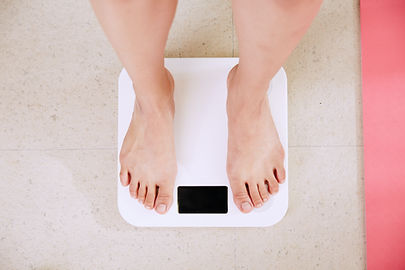
Imagine for a moment that you started a health and wellness journey in January of 2021. You’re 5 months in and you’ve lost 20 pounds. You’re happy to have lost the weight. However, for the past 3 weeks your weight loss has stopped. Your effort has not diminished. You’re still following a healthy eating plan, you’re active, and you average 7-8 hours of sleep per night. You’re beyond frustrated! You feel like you’ve hit a wall. If this resonates with you, you’ve experienced a weight loss plateau.
When a person reaches a weight loss plateau, they no longer lose weight, despite following a diet and fitness regimen. Research shows that weight loss plateaus often occur after approximately 6 months of following a lower calorie, healthy diet.
Weight loss plateaus can occur for various reasons:
1. Your body adapts to your diet and activity.
2. You’ve become a little loosey goosey when it comes to your eating plan. For example, you may have stopped tracking your food. You no longer measure and weigh your portions, choosing to use the eyeball method instead.
3. Your metabolism slows down due to burning less energy in the same workout you’ve done for months.

Weight loss plateaus can be very discouraging and demotivating. For many individuals, it becomes a reason to give up, abandoning healthy habits. It’s important to recognize that plateaus are temporary. Focusing on non-scale victories (ex: how your clothes fit, your energy level, how you’re sleeping, etc.) can keep you motivated. Your “Why” can also be a strong motivator. Why are you trying to get healthy and lose weight? Is it to avoid taking certain medications? Do you want to travel during your retirement years? Is it being around to enjoy your kids and grandkids as they grow up?
Here are some ways to break through a weight loss plateau:
1. If you’re not tracking what you put in your mouth, start a food journal. Journaling your meals, snacks, and beverages can create awareness of patterns and behaviors that sabotage your best efforts. Maybe you’re waiting too long between meals, or skipping meals altogether. As a result, you’re overeating at your next meal. Although your food choices are healthy, your portion sizes may be too large. Too much of a good thing is still too much. It’s also easy to forget small bites, licks, and tastes (BLT’s) throughout the day.
2. Change what you’re eating. If you’re a creature of habit, you may have a tendency to eat the same thing every day. Our bodies become accustomed to what we eat. This can impact our metabolism. Mix things up. You may find your satisfaction level increases.

3. Eat if you’re hungry. Do not take the mentality of less is more. Our bodies require sufficient fuel to run efficiently. If we are not giving our bodies enough fuel, they can store fat for energy. When you’re eating the right healthy foods, you may find that you’re eating more in volume than you were prior to your health and wellness journey.
4. Mix up or increase your activity. As with food, our bodies become accustomed to our activity. For example, imagine that you’ve taken up cycling. The first time you rode your bike, you managed to ride a mile. Over time, a mile became 5 miles, then 10 miles. Now you can ride 30 miles on the weekend. Riding 5 miles now, would not burn the same amount of energy that you generated when you started cycling. Your stamina and muscle mass has improved. Your heart rate is lower. In order to get the same workout benefit, you have to ride further or at a higher intensity.

5. Reduce your stress. If you lead a stressful life, your body can overproduce cortisol. This can lead to weight gain. An overproduction of cortisol can cause cravings for high fat, high calorie food. It can also cause weight gain around the abdomen.
6. Get 7-9 hours of sleep per night. Lack of sleep also impacts cortisol levels, which can cause weight gain. When you’re sleep deprived, you’re less likely to be active. Your body looks for quick energy. You may experience cravings for sugar and carbs.
7. Drink an average of 64 ounces of water per day. Water not only keeps you hydrated, but flushes out toxins that can cause digestive issues and weight gain.








